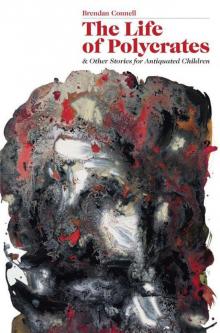- Home
- Connell, Brendan
The Life of Polycrates and Other Stories for Antiquated Children
The Life of Polycrates and Other Stories for Antiquated Children Read online
The Life of Polycrates
and
Other Stories for Antiquated Children
The Life of Polycrates
and
Other Stories for Antiquated Children
Brendan Connell
Chômu Press
The Life of Polycrates
and
Other Stories for Antiquated Children
by Brendan Connell
Published by Chômu Press, MMXI
The Life of Polycrates and Other Stories for Antiquated Children copyright © Brendan Connell 2011
The right of Brendan Connell to be identified as Author of this
Work has been asserted by him in accordance with the
Copyright, Designs and Patents Act 1988.
Published in March 2011 by Chômu Press.
by arrangement with the author.
All rights reserved by the author.
First Kindle Edition
This book is a work of fiction. Names, characters, places and incidents either are products of the author’s imagination or are used fictitiously. Any resemblance to actual events or locales or persons, living or dead, is entirely coincidental.
Design and layout by: Bigeyebrow and Chômu Press
Cover artwork: Head with Turban by John Connell
Artwork photography by John Vokoun
E-mail: [email protected]
Internet: chomupress.com
for Sujata
Contents
1 The Life of Polycrates
2 Collapsing Claude
3 The Dancing Billionaire
4 Brother of the Holy Ghost
5 Maledict Michela
6 The Life of Captain Gareth Caernarvon
7 Molten Rage
8 The Chymical Wedding of Des Esseintes
9 The Search for Savino
10 The Slug
11 Peter Payne
Endnotes
The Life of Polycrates1
With them you too, Polycrates,
shall have immortal fame for beauty
as long as my song and fame shall last.
—Ibycus
—The Oxyrhynchus Papyri
Und wenns die Götter nicht gewähren,
So acht auf eines Freundes Lehren
Und rufe selbst das Unglück her;
Und was von allen deinen Schätzen
Dein Herz am höchsten mag ergötzen,
Das nimm und wirfs in dieses Meer!
—Friedrich Schiller
—Der Ring des Polykrates
I.
Chronological Table:
50th Olympiad . . . Birth of Pythagoras.
52nd Olympiad . . . Tisander wins at boxing. Amasis becomes Pharaoh of Egypt.
53rd Olympiad . . . Tisander wins at boxing.
54th Olympiad . . . Tisander wins at boxing.
55th Olympiad . . . Tisander wins at boxing. Croesus becomes King of Lydia. Death of Aesop.
56th Olympiad . . . Nabonidus becomes King of Babylon.
57th Olympiad . . . Ariston and Anaxandridas are kings of Sparta. Pythagoras invents the octave.
58th Olympiad . . . Polydor wins at the pankratium. Cyrus, founder of the Persian Empire, defeats King Croesus of Lydia.
59th Olympiad . . . Echoiax invents fish sauce.
62nd Olympiad . . . Cyrus dies, and is succeeded by his son Cambyses.
64th Olympiad . . . Death of Polycrates. Death of Cambyses. Darius becomes King of Persia.
II.
Sigla:
< > conjectural conceptions
[ ] uncertain reading
<< >> scriptural references
{ } offstage comments
III.
Aeaces ruled, together with its city of Samos, the island of Samos, that piece of land in the Icarian Sea, separated from the coast of Ionia by a strait, narrow, less than a mile wide. That tract of solid earth’s surface, completely surrounded by water and washed by the sea, was for the most part level, but with its share of natural elevations, with Mt. Ampelus, and with fertile soil—figs, pears, grapes, apples and fragrant rose-apples, from that tree of greenish-albumen-tinted flowers, ripened there twice a year; its forests cried with peacocks, and low hills were spotted white with sheep, in places grey-green with olive groves; its circumference was about eighty miles and it had numerous pretty temples, to Zeus Ceravneos, to Apollo Nymphegetes, to Dionysus Dallius Anthestius and to many others, though most notable of all was the Heraion.
Aeaces had three sons, Polycrates, Pantagnotus and Syloson. Polycrates was the oldest, and the heir of Aeaces. He was handsome, had a strong, energetic body and though short of stature was among the best wrestlers on the island. He could swim well—to the Ionian coast and back,—run fast, throw the javelin a long distance, lift and hurl great stones—and he won many athletic competitions2, was skilful at all sorts of martial feats, hunting, horsemanship and the employment of arms—and yet never bragged about his obvious ability.
Quick of comprehension, fully intelligential, from Pherecydes, the son of Babis and teacher of Pythagoras, he learned about the seven parts of the universe and the history of the world. From Phileus, the father of Rhoecus3, he learned about the principles of the metallurgical sciences. His tutor in letters was the poet Anacreon, who worshipped with equal fervour Art, Wine and Love, and told his student about the affairs of Asia and his own rather ridiculous adventures [as spear-for-hire, horseman, composer of ballads and epitaphs for sailors and the slain flower of forces]. He taught the youth how to play the magdis and sing, beautiful hymns to Artemis, Dionysus and Hera; and the subtleties of language, the various tricks involved in composition and declamation.
“Never invent new words,” Anacreon said. “In public speaking never use strange phrases or antique words that have grown out of use, though both of these, in written works, are not only acceptable, but recommended and should be searched out with zeal; for the former shows you of original mind, the latter one acquainted with the classics and great authors, with Homer, with Pythermus. . . . Use noble words, an arsenal of words, exquisite words—treasure up old poems in your mind, for they will add to your compositions a patina of antiquity and to your speech force of expression . . . with which to forestall objections, ask questions, postpone opponents, marshal proofs and fill their gaps with padding . . .”
Later, upon entering his early manhood, Polycrates travelled. He went across the sea to Crete, the birthplace of Zeus . . . Cyprus . . . . . . visited Egypt, bearing a letter of introduction to Khnem-ib-re, King Amasis, who served his guest wine of Thebes flavoured with petals of violets; feasted him on Nile fish resting beneath blankets of herbs, colocasium, and sesame cakes bathed in honey. Slim, smiling and silent young women fed him candied papyrus piths while groups of minstrels filled the air with exotic song, cymbals and the sound of the twenty-two stringed harp. The king took Polycrates on excursions to Crocodilopolis and Oxyrhinchus; showed off his building projects, his temples, of Isis, Philae, Edfu, Sohag, Koptos and Abydos; in Sais the magnificent gateway to the temple of Athena; and the numerous granite colossi, large man-headed sphinxes, criosphinxes and hierosphinxes, which great artists were carving at his commission. . . . Then Polycrates visited Babylon, where he was especially impressed with the sewage system and palace privies; the hanging gardens, the dazzling splendour of temple buildings, the shrine of Merodach . . . . . . fortification walls and paved processional ways.
IV.
When he returned home Polycrates found that his father had been assassinated and replaced by a hastily composed oligarchy, made u
p of the heads of the richest families of the island. The usurpers, in order to avert accusations of injustice from the populace, left the sons of Aeaces with lives unthreatened and a patrimony largely intact. Ambitious and desiring the power he considered rightfully his, Polycrates became a popular citizen by giving donations to the poor, who were naturally much more numerous than the rich. He gave fine clothing to the elderly, a meal every day to any Samian who wanted it, and, tearing down the fences that surrounded his orchards and vineyards, let the people pick fruit, figs, pears and grapes, as they wished. When he went out, he was accompanied by a servant carrying a bag of coins, and this man was instructed to distribute the money freely to all who asked for it. He also often contributed toward the expense of funerals, and lent his own couches and goblets, which were quite gorgeous and costly, to be used by anyone who was preparing a marriage-feast or extraordinary entertainment.
And, just as he had made himself popular, he determined to do the opposite to those who had diverted power from him, and stripped away the breath of life from his father.
His brother Syloson was in general a man of no great worth, effeminate in his manners and of lazy habits; but he had a certain skill in composing verses and silly epigrams; and over cups of wine the brothers would sit, Polycrates and Pantagnotus speaking harshly of those who had done them wrong, Syloson letting absurdities trickle from his tongue, bubble from his lips, which the other two would joyfully scribble down. . . . Then, in the middle of the night, the brothers would sneak through the town and paint these words on the walls of the most prominent buildings. Of Rea, the wife of Sarapammon, they wrote:
Rea, see her jowls dripping with oil of land-snail,
face plastered over with layers of white lead;
fourteen sons have flown from her one womb;
but none are squat, podgy like Sarapammon.
Of Hieronymus, who had prospered greatly by the destruction of Aeaces:
Hieronymus wrestles with blind Aristippus
in the humid shadows of the gymnasium;
then shares his cloak with homeless Rhadamanthys,
a stench worse than toad guts!
V.
The image of Hera, that primordial goddess, the genetrix of all things, was originally a plank of wood, a simple aniconic fetish, but later the artist Smilis, son of Eucleides and a contemporary of Daedalus, carved it into the figure of a woman of celestial beauty. . . . The maidens, with great care, bathed her in the water of the dark sea; then, on the pebbly beach, they dressed her in an apoptygma embroidered with flowers, tied a golden pendant around her neck and attached gold bracelets to her wrists. She was raised up, and under the orange-coloured sun carried to the Heraion. Nearly the entire citizenry of Samos, and many from Ephesus, Miletus, Icaros and Tragia followed behind, making their way in animated and serpentine procession along the twisted trail. Musicians clasped their lyres and pipes and walked with mincing steps; and choirs of bare-chested youths strode forward, songs going from lip to lip, describing in language rich with metaphor the glorious qualities of the bride of mighty Zeus, the great protecting queen of the isle;—all were prepared and ambitious for the musical and athletic competitions that were to be held later that day.
And then there were the mothers who, with garlands of lotus flowers entwined over respectably full breasts, led their children by the hand. And people of every age and station of life, laughing, murmuring, whispering: some faces grave with faith: old men leaned upon canes, tipsy from indulging in extra holiday cups: rich citizens took deliberate, pompous strides, their hair luxuriously braided and dripping with costly, sweet-smelling oils: militiamen, warriors of the city were there possessed of arms, to symbolically deposit at the feet of the goddess as offering: and Pantagnotus and Syloson bore spears.
“I never realised how heavy a spear was,” said Syloson, shifting the weapon from one arm to the next.
Pantagnotus looked at his brother with disdain, and asked in an undertone, “Are you sure you are even able to use it?”
“Well, if I have to stick it in some poor brute’s guts in order to get rid of it, I believe that I am quite able. It is such an uncomfortable piece of luggage . . .”
They walked with the people, followed the deity.
And she was carried along the reedy bank of the river Imbraxos, beneath the willows, and those tender and dripping branches tickled her face and figure; beneath the Lygos tree, under whose shade she herself had travailed; and to the temple, which was now surrounded by booths where small votive offerings and foodstuffs were sold, cakes of sesame and honey sitting in high stacks, pyramidical rolls of wheat, anchovies sizzling in hot pans and radiating a delicious odour, and small roasted birds full ready to fly down one’s throat as if of their own accord. Fourteen oxen were corralled nearby, their thighs destined for the sacrifice; and the men let their tongues run over their naked lips or moustaches, for the remaining meat would be theirs, roasted to consume. Conspicuous was the great bronze cauldron of Colaeus, which was five feet high and endowed with marvellously worked griffin protomes, itself resting on three kneeling figures of carved marble, each ten feet high. The temple was filled with offerings; ivory carvings from Phoenicia; masterfully crafted small bronze votives from Egypt; cloths from Syria, Mesopotamia and Persia; Etruscan, Laconic and Corinthian ceramics; Attic black-figured vases; and thousands of terra cotta offerings from Cyprus. She, Hera, was set at the head of the high altar, besides which were heaped the ashes of countless former sacrifices. A vine tendril was placed on her head, by way of crown, and a lion skin laid at her feet.
Now women placed garlands of poppies and baskets of pomegranates, each rich in seed, before that goddess who was mistress of both vegetation and fertility, while the white-robed gold-decked neopoiai, the guardians of the temple, looked on and recited sacred hymns. Then the warriors approached, and each in turn lay their arms at the feet of Hera; but Pantagnotus, Syloson and fifteen of their followers hung back, so that when all other men were unarmed they brandished their weapons and in a body made a threatening cry.
Then Pantagnotus spoke, in a loud voice, his lips stretched back so all could see sharp white teeth set in blood-red gums. “People of Samos,” he said, “for a long time now my family has been denied its rightful position, Polycrates, my elder brother denied his throne. From this day forward it will be otherwise, for Lord Polycrates, who the goddess Hera will always favour, has secured the city nearby, and we here who stand before you with sharp swords and spears quivering for seditious flesh, will take appropriate action against any who do not wish to live under his and our benevolent rule.”
The people turned their eyes to the city, and saw distantly the minute appearance of men waving red flags at key points along the wall, and smoke rising up from certain locations, from those places where the mansions of the oligarchs sat. At this, several brave men of those noble families, Hieronymus amongst them, rushed upon the altar for their weapons, but they were instantly cut down, and their blood spilled over the white temple stones, Hieronymus pierced through the heart by the tip of Pantagnotus’ spear. The majority however did not make any rebellious outcry, for they had been well treated by Polycrates, drunken the wine of his table, eaten the fruit of his orchard, their fathers and grandfathers clothed in garments delivered by his hand; so they voiced their support, chanted Polycrates’ name, and those who were still opposed (such as Sarapammon) did not dare to openly show discontent, because it would be at the cost of their lives. So the sons of Aeaces came to rule Samos.
VI.
At the beginning Polycrates divided the state into three parts, Hesia, Aeschrionia and Astypalaia. He gave Hesia to Pantagnotus, Aeschrionia to Syloson, and kept Astypalaia for himself. But this arrangement turned out to be unsatisfactory. Pantagnotus and Syloson were both covetous of money, the latter because it could buy him luxury, the former, power.
Pantagnotus surrounded himself with a bodyguard of criminals, convicted murderers from Mysia and Euboea, cut-throats
who would hazard their lives for ignominy, profligate youth from home and abroad, young men who had squandered their patrimony on lewd female companions and fatty comestibles, who, through laziness, had barely kept from perishing from lack of food on their own estates and came to Hesia (which had become like a sewer) to make good pay by performing simple though vicious deeds. He stripped temples of their treasures, demanded gifts from all landowners, confiscated the property of widows, taxed and fined many citizens unjustly and had others put to death, simply to gain possession of their goods, and left their children to wander naked through the countryside, disenfranchised orphans; so Hesia, the territory that was his own, suffered as if it were under the rule not of a native, but rather some foreign oppressor eager to inflict retribution, to rob and humiliate the people. And his power grew. He gathered in stores of arms and armour and attracted more followers, paying for it all at the expense of the community.
. . . . . . he enjoyed watching flying insects kill themselves in a candle flame; he stabbed a man in Magnesia just to watch him die; throughout Hesia he placed spies and eavesdroppers; if a man spoke badly of him, Pantagnotus would have his nose slit or even cut off along with his ears.

 The Translation of Father Torturo
The Translation of Father Torturo The Architect
The Architect The Life of Polycrates and Other Stories for Antiquated Children
The Life of Polycrates and Other Stories for Antiquated Children